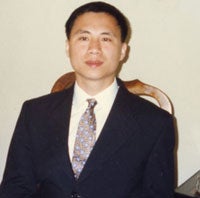Tiananmen, 15 Years On
Where Are Some of the “Most Wanted” Participants Today?
 |
| Photo courtesy of Open Magazine |
“We make no attempt to conceal the aim of the current student movement, which is to exert pressure on the government to promote the progress of democracy. People’s yearning for democracy, science, human rights, freedom, reason, and equality, which lack a fundamental basis in China, have once again been aroused.”
—May 1989
“The future for democracy in China is dependent not just on political institutions but on the growth of a vibrant civil society.”
—May 25, 2004
Wang Dan’s leadership role in Tiananmen Square earned him the top spot on China’s list of “21 Most Wanted Beijing Student Leaders.” It also earned the soft-spoken history major with the bullhorn and large round eyeglasses a prison sentence of four years for “counterrevolutionary propaganda and incitement.” Wang’s activism pre-dated the official start of the pro-democracy movement. He was a key organizer of the campus open-air “democracy salons” during which sensitive political subjects were up for discussion. From the time Wang was released in February 1993 until his re-arrest almost two years later, he was harassed endlessly. He could not return to Beijing University; officials refused to allow him to complete a correspondence course offered by a U.S. university; police threatened him with death. Re-arrested in 1995, Wang was sentenced to an eleven-year term for “plotting to subvert the government.” In 1998, he accepted exile in the U.S.
Today, Wang is immersed in writing his dissertation, “A Comparative Study of Political Terror in Taiwan in the 1950s,” and in furthering democracy in China.
More Profiles:
 Wang
Dan Wang
Dan“ The future for democracy in China is dependent not just on political institutions but on the growth of a vibrant civil society.” —May 25, 2004 |
 Feng
Congde Feng
Congde“Tiananmen was the beginning of the end of the communist camp. It was a wake-up call to Chinese inside and outside China.” —May 2004 |
 Zhang
Boli Zhang
Boli“1989 stands out as a beautiful moment. We stood up. It wasn’t easy. Overturning the government’s official verdict isn’t important; what’s important is what we did. History will judge us properly.” —June 2, 2004 |
 Liu
Gang Liu
Gang“We didn’t fail—failure is the mother of success. There’ll be more chances—and we have more experience.” —May 2004 |
 Zheng
Yi Zheng
YiZheng worked with other intellectuals to craft statements of support for the students including the famous “Declaration of May 16.” |
 Wang
Chaohua Wang
Chaohua“I jumped into the center of the movement. I thought I could make a decision for myself....But this...decision had repercussions for others, including ones I love dearly.” —May 26, 2004 |
 Li
Lu Li
Lu“Once in [Tiananmen] Square you did anything and everything that needed doing.” |
 Zheng
Xuguang Zheng
Xuguang“Within the movement we consistently adhered to the principles of peace, reason and nonviolence.” —1993 “Peace Charter” |
 Zhang
Ming Zhang
Ming Accused of inciting subversion and attempting to overthrow the socialist system, Zhang was sentenced in January 1991 to a three-year term. |
 Xiong
Yan Xiong
Yan“We believe, no matter whether the government does or does not, that history will recognize this movement as a patriotic and democratic movement….” —May 1989 |
 Wang Juntao Wang Juntao“Tiananmen changed Chinese history. It was a benchmark in Chinese political development, furthering the liberal trend of the 1980s and destroying the legitimacy of the Chinese Communist Party.” —May 2004 |
 Ma
Shaofang Ma
ShaofangMa Shaofang, the former Beijing Film Academy student who was No. 10 on the most wanted student list, has remained politically active in China. |
 Wang
Youcai Wang
Youcai“The development of a democratic system is crucially important. Democracy is the only way to avoid a second Tiananmen.” —May 2004 |
 Yang
Tao Yang
TaoAuthorities charged Yang Tao had been an instigator of a “counterrevolutionary rebellion,” had “advocated bourgeois liberalism,” and “wantonly attacked Marxism.” |
 Han Dongfang Han Dongfang“1989 was the very first time the Chinese people themselves directly faced the regime. Before that time, there was only hope. —May 2004 |
 Zhou
Fengsuo Zhou
Fengsuo“It was the one time I experienced the beautiful character of the Chinese people longing for a democratic China where we could freely speak our minds.” —May 2004 |
 Zhang
Zhiqing Zhang
ZhiqingZhang Zhiqing, No. 16 on “Wanted List 1,” disappeared from view shortly after June 4, 1989. None of the other students on the most wanted list has heard from him since. |
 Yan
Jiaqi Yan
JiaqiBy the time the 1989 protests came to a head, Yan Jiaqi had years of experience in reform politics, working both inside and outside the system. |
 Lu Jinghua Lu Jinghua“Tiananmen 100 percent changed my life. Even since ’89, I’ve tried to make people understand what life without human rights is really all about.” —May 24, 2004 |
 Fang
Lizhi Fang
Lizhi“June 4, 1989 was one of the most important events of the last century.” —May 2004 |
Reports
Nipped in the Bud: The Suppression of the China Democracy Party
Slamming the Door on Dissent: Wang Dan’s Trial and the New “State Security” Era
Leaking State Secrets: The Case of Gao Yu
China: Enforced Exile of Dissidents" Government "Re-entry Blacklist" Revealed
Further Reading
Chinese Scholars Detained
Human Rights Watch Campaign Document
Tiananmen Mother’s Campaign
Off-Site Link
Dr. Jiang Yanyong’s Letter and Petition
Off-Site Link